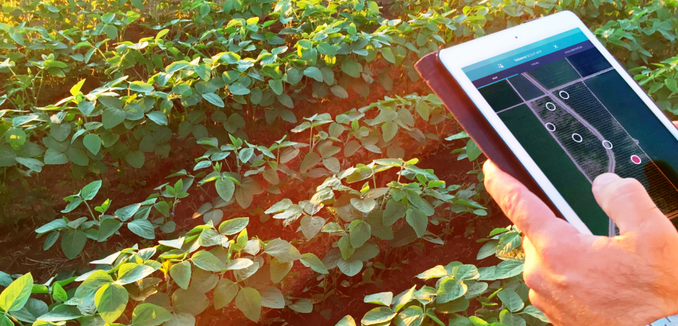It began with four co-founders in “garage” mode in 2015. Less than four years later, Israeli ag-tech company Taranis has nearly 60 employees, five overseas offices, two acquired companies and $30 million in investments.
About 19,000 farmers use the agriculture platform to make decisions about preventing disease and pest infestation in crops such as wheat, corn, soybeans, cotton and potatoes on a cumulative 20 million acres of fields in Argentina, Australia, Brazil, Canada, Israel, Russia, United States, and Ukraine.
“The last three years have been pretty amazing,” acknowledges Taranis CEO Ofir Schlam from the company’s Tel Aviv headquarters. “There are a lot more needs in the field, a lot of demand for our product and more ways to use our basic technology better.”
Raised in a farming family, Schlam believed more accurate predictive models could prevent many of the world’s multibillion-dollar crop losses caused by weather, fertilizer deficiencies, diseases, and insect and weed infestations.
Taranis’ hardware and software combine high-resolution aerial imaging with computer vision and deep-learning technology.
“The hardware does aerial imagery in very high resolution. This is the basis for our newest product, AI2,” says Schlam. (That’s AI as in “aerial imagery” and “artificial intelligence” and 2 as in “squared.”)
“We can capture clear images down to the insect and leaf level from planes traveling at 200kph and drones at 55kph. Nobody else can offer that capability; the closest on the market is 1,400 times lower than our resolution and only shows a portion of the field.”
Schlam says some agricultural aerial-imaging systems simply provide a postmortem of what went wrong. Taranis’ real-time imaging and analysis let farmers implement measures to prevent damage from occurring.
“The hardware is an enabler,” Schlam explains. “Once we capture this immense amount of data the farmer needs help analyzing it. We use the latest deep-learning technology, and our hundreds of agronomists train the system in how a crop or weed looks and which insect and diseases threaten it so that the software can find it automatically the next time.”
Largest dataset in the world
Over the past year and a half, Taranis has collected a dataset of more than 10 million agricultural symptoms, probably the largest such dataset in the world according to Schlam.
Taranis cofounder and CTO Eli Bukchin, who previously invented meteorological systems for the Israel Defense Forces, recently discussed the process and challenges involved in such a huge endeavor at a professional computer-vision meetup in Israel.
“We had to overcome a lot of computer-vision problems because of the unprecedented resolution and scale,” explains Schlam.
To overcome this challenge, Taranis needed not only software engineers (who make up half the company’s team) but also hardware experts.
Fortunately, Schlam notes, Israel has no shortage of talent in the areas of computer vision, remote sensing, and agronomy.
“While we were in our seed round we acquired Agra, an Israeli startup whose founder is an electro-optics professional from Elbit and Israel Aerospace Industries and is the son of an agronomist,” says Schlam.
In May 2018, Taranis bought out San Francisco-based Mavrx, one of the world’s leading agriculture aerial imagery providers.
Millions in revenue
After graduating from prestigious Israeli accelerators Microsoft Ventures and 8200 EISP, and testing its system with Israeli pear growers, Taranis rolled out its product in the late 2017 commercial season on large farms in Brazil and Argentina.
The company now has branch offices in those two countries as well as in the United States, Russia, and Ukraine.
“Our revenue in the last year was in the millions of dollars,” says Schlam. “We had three rounds of investment and gained really good partners who will help us get to more end clients.”
The latest round was in November 2018, when Taranis closed a $20 million Series B led by Viola Ventures with participation from existing investors Finistere Ventures, Vertex Ventures, OurCrowd, Eyal Gura and Gal Yarden as well as strategic investors Nutrien (the world’s largest fertilizer company), Cavallo Ventures, the venture capital arm of Wilbur-Ellis, and Sumitomo Corporation Europe.
Viola Ventures Partner Zvika Orron noted that Taranis was its first investment in the digital farming industry.
“Taranis has all the necessary ingredients to become the leader in farm digitalization: a comprehensive precision agriculture solution, leading industry partners to scale and penetrate the market and a passionate team making it all happen. Taranis’ solution provides both the diagnosis of the problem as well as the cure,” said Orron.
However, Schlam says Taranis does not aim to be profitable at the moment. “We are focused on hiring and expanding the product further because the opportunity is so massive.”
Israel has a large and growing precision ag-tech sector. Start-Up Nation Central’s Start-Up Nation finder lists 451 companies offering smart solutions for many aspects of farming. But the Taranis cofounders saw an unmet need for high-resolution imaging and analysis.
“The market is large enough and segmented enough for all the ag-tech companies here, and we are happy to offer mentoring and advice,” says Schlam. “We don’t develop our own sensors or drones, so we can see opportunities to work with others in Israel.”
(via Israel21c)
[Photo: Israel21c ]




